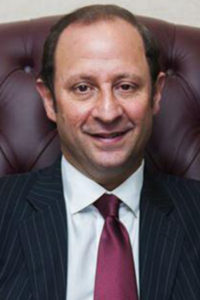
As director of the pulmonary and critical care medicine fellowship at New York-Presbyterian Brooklyn Methodist Hospital, Anthony Saleh, MD, FCCP, is committed to extending opportunities for expertise honing and presentation to individuals who have not yet achieved fame in the field.
“It gives me such pleasure to see fellows come in wet behind the ears, and by the time they leave, they’re experts in pulmonary and critical care,” Dr. Saleh said, reflecting on working with fellows. “Then through ‘case puzzlers’ programs, these people who don’t have big faculty appointments get a chance to have well-known academic physicians look at how they’ve managed cases. Often times, the well-known academicians are appreciative of the management insights provided by physicians who are early in their careers.”
This is one of several reasons why Dr. Saleh is excited to chair the Cystic/Cavitary Lung Disease Case Puzzlers session on Wednesday at 8:45 am in room 295 of the convention center. The session will feature a panel presentation of two cavitary and cystic lung disease cases—one based in the U.S. and the other international. After each case is presented, a clinician, a pathologist, and a radiologist will then dissect it, share their own field-based strategies for understanding it, and arrive at a diagnosis together. Then, Dr. Saleh will open the floor to the session attendees, inviting them to explain why they agree or disagree with each diagnosis.
Although the session has been designed primarily for pulmonary-critical care physicians seeking to augment their knowledge of cystic and cavitary lung diseases, Dr. Saleh believes that it is timely and broad in its relevance.
“In many instances, these cavitary and cystic lung diseases are systemic,” Dr. Saleh said. “Many people diagnosed with them have cardiac issues, gastrointestinal issues, and rheumatological issues that began in their lungs.”
One recent social phenomenon appears to be a growing factor in cystic and cavitary lung disease cases, as Dr. Saleh reports: “Vaping is having devastating consequences. The lung diseases it causes can manifest as cystic and cavitary. This is not only a medical issue; it’s also a societal issue requiring people to get their acts together and not vape.”
Ultimately, Dr. Saleh hopes that attendees will leave the session as better advocates for their patients. He believes this will come from enhanced understanding of how to work together as clinicians, pathologists, radiologists, and other medical practitioners to make prompt diagnoses for cystic and cavitary lung diseases, which can manifest as lung cancer, tuberculosis, lymphangioleiomyomatosis, and a number of other deadly diseases. These diseases often cause rapid deterioration, Dr. Saleh explains, so prompt treatments are required for them.
Attendees should arrive at the session knowing that it will be interactive, with input even from newcomers to the field welcomed and multidisciplinary perspectives encouraged throughout the hour.





